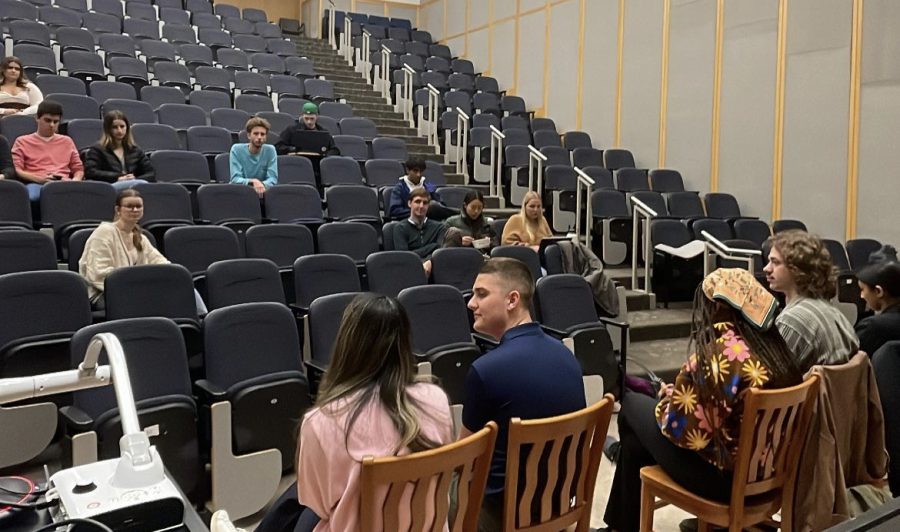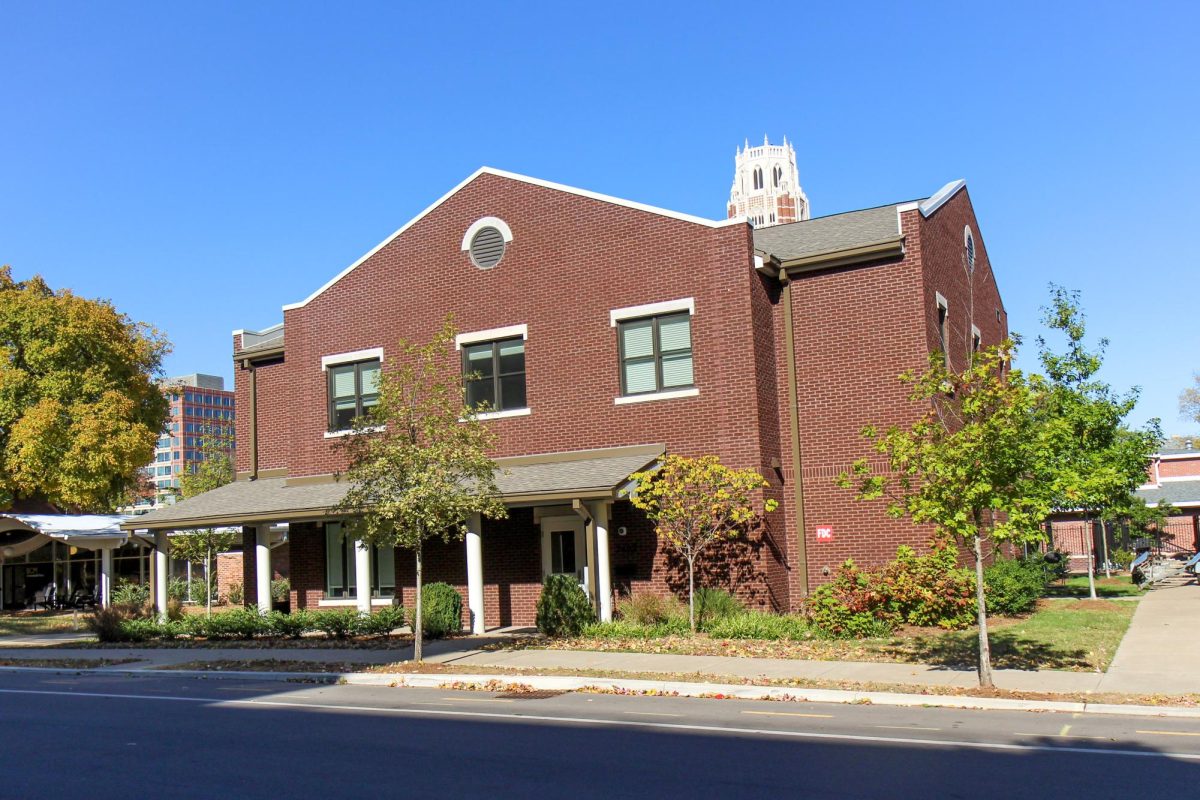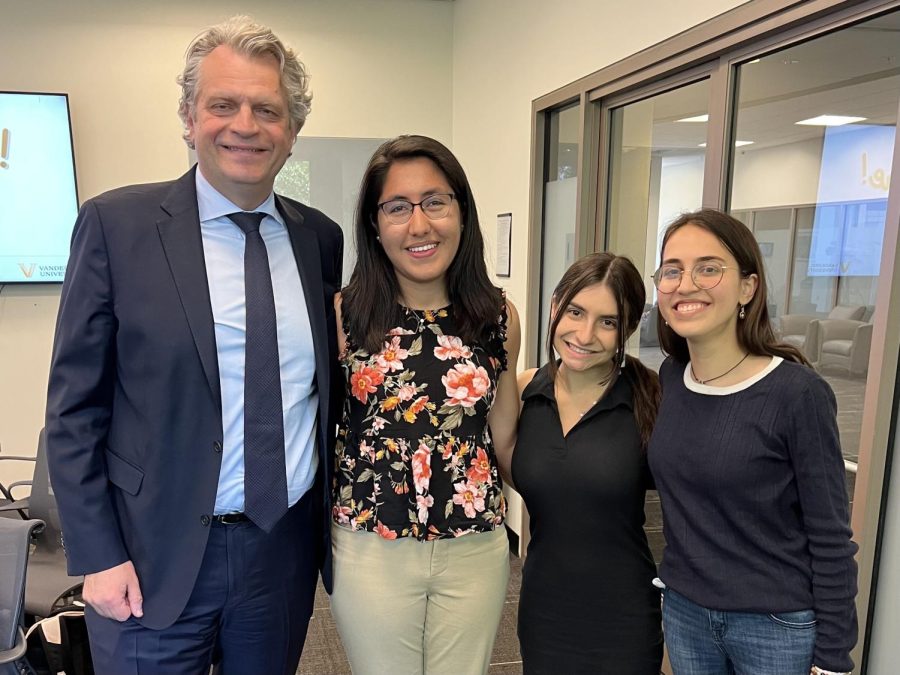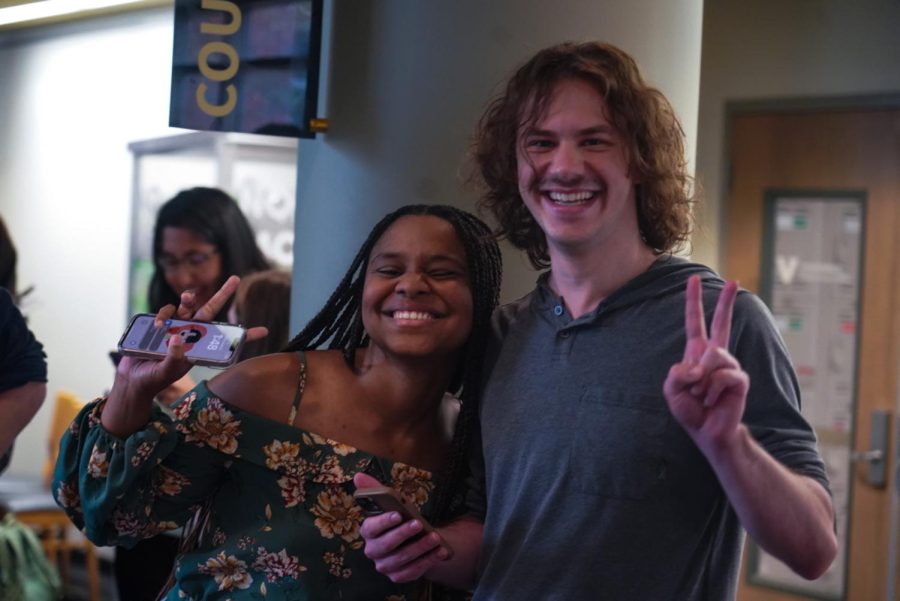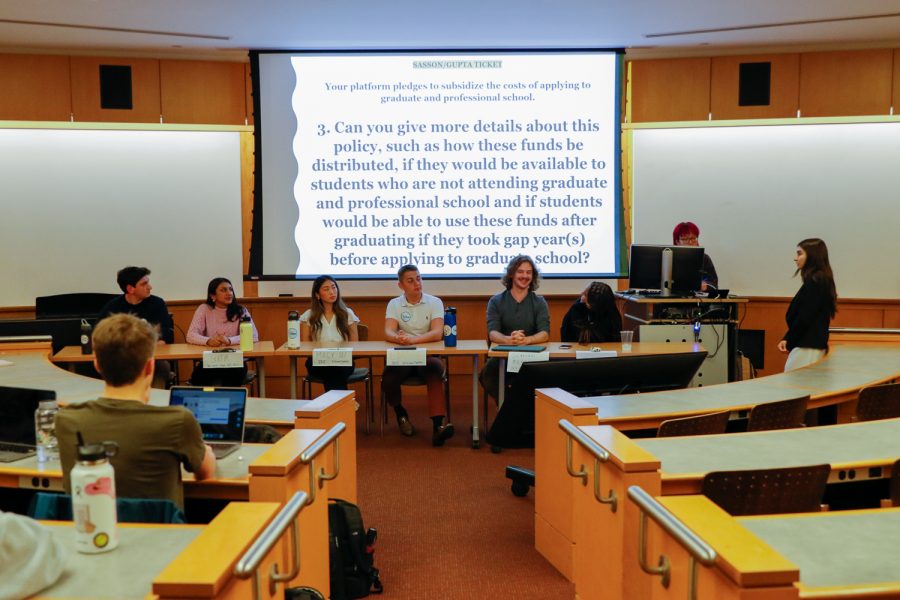Editor’s Note: This piece mentions sexual assault.
The Multicultural Leadership Council hosted its annual caucus for the 2023 VSG presidential and vice presidential election on March 22. Moderators Ray Kongmanychanh, a junior and MLC special events co-chair, and Zack Maaieh, a sophomore and MLC publicity co-chair, asked this year’s candidates about how they plan to support and advocate for minority student populations, as well as collaborate with multicultural organizations.
This second of three debates, the first of which was held a day prior by The Hustler, featured juniors Ari Sasson and Shreya Gupta, juniors Samuel Sliman and Kendelle Grubbs and junior Macy Su and sophomore Lonnie Smith. The third and final debate, hosted by VSG, took place on March 25 at 11 a.m. CDT.
Role models and involvement with multicultural communities
When asked about specific outreach he has done to build relationships with multicultural communities, Sasson said that he worked with the Pakistani Students Association, Dores in Solidarity with Palestine and 12 other groups in creating the MLC senators bill. He named MLC President Safa Shahzad, a senior, as his role model for leadership.
“I admire her hard work and dedication over the years. I understand that an important component of good leadership is a consistent approach, actually putting the time in to do the things that you say you believe in,” Sasson said.
Gupta said she regularly engages with the South Asian Cultural Exchange and other “relevant events” on campus, including socials hosted by the Caribbean Students Association and VSG. She said Hidden Dores President Indu Kumar, a junior, most inspires her.
“We lived on the same floor freshman year. Looking up to her [them], I really got interested in social activism, and working with her [them] has allowed me to have the confidence to pursue this goal of VP,” Gupta said.
Su said she is part of the Asian American Students Association and added that she and Smith have taken “big strides” to connect with cultural organizations on campus. She said she looks up to Shun Ahmed (‘22), who served as VSG vice president in the 2020-21 academic year, for her resilience, mentorship and kindness. Su added that Shun’s influence was a major factor in her decision to run for elected office, which she and Smith have been planning to do since the fall semester.
“[Ahmed] graduated last year, but I think that speaks volumes to exactly how much impact she has,” Su said. “She just gave such great advice on exactly how she was able to do things when she got struck down by administration.”
Smith said his primary multicultural involvement is with Next Steps Ambassadores and looks forward to developing relationships with more organizations on campus. His role model on campus is Vanderbilt Lambda Association Community Relations Director Chandler Quaile, a junior.
“As a queer student on campus, it is awesome to see how we’re making progress and taking steps to ensure that all students in our community are feeling represented and also feeling heard,” Smith said.
Smith added that his and Macy’s platform reflects input from multicultural groups, including from the Black Student Association and Next Steps Ambassadores.
“The good thing about our platform is that no matter who we were talking to, our platform was always changing based on the student’s needs,” Smith said.
Sliman said that, though he has not engaged much with cultural groups “on an organization level,” many of his closest friends are part of such organizations. He echoed Su’s mention of Ahmed as a leadership role model.
“My freshman year, when we were doing Swipes for Cause, she stepped in and was just an incredibly massive help in pushing that initiative forward. Afterward, she’s been a really close friend. I do not think we have seen a more impressive student here since — just an incredible human being,” Sliman said.
Grubbs shared that her primary involvement in multicultural spaces has been at the K.C. Potter Center and the Black Cultural Center. She said she looks up to former Vanderbilt Lambda Association Vice President Sydney Williams, a senior, for their LGBTQ+ community advocacy on campus. Grubbs later clarified in a message to The Hustler that she was referring to Sydney Stewart, not Sydney Williams.
“Sydney worked as one of the heroes of KCPC, and I’ve always admired Sydney’s greatness,” Grubbs said. “I admire the work that they did, whether it’s drag shows or protests. I like that she’s [they’re] outspoken about things she [they] cares about, like advocating for the LGBTQ community on campus.”
As editor-in-chief of The Slant, Sliman said he and Kendelle are limited in their current capacities by merely being able to comment on issues, rather than taking action on them.
“That means our primary voice and power is just offering commentary on things, painting things in a satirical light in order to draw attention to the absurdity of some things that go on,” Sliman said. “A lot of times, we’re able to make these points but don’t necessarily have the power to do much of anything about it. I think that’s what actually moving into a role in VSG might change.”
Addressing Diermeier
Each candidate was asked about what they would tell Chancellor Daniel Diermeier if given 45 seconds to speak with him.
Su encouraged Diermeier to prioritize the needs of students and expressed a desire for him to work more closely with VSG.
“There have been a lot of instances — though no one’s perfect — but things such as land acknowledgement, where students outside have really really shown that there are things the students want, and administration have to do something about. Yet, they refuse to put any official statement out and refuse that to be part of their actual initiative,” Su said.
Smith said he believes Diermeier should take one day “to be a student.”
“I want him to understand what struggles we go through every day, where students are going, where are we lacking resources for students, and really help Chancellor Diermeier be on the level of the student and actually engage with other students, rather than engaging through emails and other forms,” Smith said. “My goal is to really help our administration understand what the student experience is like so they can work with us.”
Sliman commented on Giving Day, which will occur on April 27, when the university asks its alumni and community members for donations.
“Hey Danny, is it alright if I call you Danny? After all that consultant stuff, here you are groveling, begging for money on Giving Day for seniors to give back. Don’t you think that’s a little bit greedy, Danny? It doesn’t have to be this way,” Sliman said.
Of Vanderbilt’s existing wealth, Grubbs said she believes redistributions should occur to better help students on financial aid.
“We have so much money in this institution. We have students over winter break who can’t get meals, and it’s cold outside, and the roads are icy, and they have nowhere to go,” Grubbs said. “And we’re telling them, ‘hey, you have to walk to Kissam,’ or telling students on financial aid that we can’t get them more, that they should take out a loan. We have the money to help as many people as we can, and it is time that Diermeier actually steps up.”
Sasson emphasized the importance of representation and addressing every student’s needs.
“Each and every one of us have unique backgrounds, perspectives, means and needs,” Sasson said. “Make sure that each and every one of us can get the most out of Vanderbilt.”
Gupta encouraged Diermeier to end his policy of principled neutrality, become more involved in student life and advocate for students’ and workers’ rights.
“Talk to the students who are struggling, not just the student leaders who are probably doing great. Take a stance against the anti-drag law, take a stance against the anti-trans law. Take a stance against construction workers being underpaid. The two construction workers who passed away on campus, say something about that — acknowledge that,” Gupta said. “Actually walk around campus and make this commitment to your students and actually get to know what goes on here.”
Audience questions
One student in the audience asked Sliman and Grubbs the reasons for their decision to run, comparing the way in which they might potentially divide the vote to Ye’s 2016 presidential election campaign.
“I definitely think that’s a little bit disrespectful to refer us to Kanye, who has made antisemitic and racist remarks, but I definitely think that while a lot of our platform points are satire and we are from The Slant. When we were thinking about our platform points, we were thinking of what we heard from previous campaigns that will never come true and we know they’re not going to come true — we’re upfront about it,” Grubbs said. “Through doing this satirical campaign, our goal is to expose what is wrong with VSG and to give a voice to the student body and to voice their complaints.”
Another student asked about the rise in antisemitism in the U.S. over the past year, citing the recent vandalism in Nashville’s Sylvan Park neighborhood. Sasson responded by sharing his perspective as a Jewish student at Vanderbilt.
“I think it’s important for Jewish students to feel safe, but I also think it’s important for all students to feel safe,” Sasson said. “There’s a responsibility on student government to make sure there are resources available to all communities when they need it.”
Grubbs referenced the incident in which football assistant coach Dan Jackson publicly backed Ye’s antisemitic comments in November 2022 and criticized Vanderbilt for its response to this situation.
“Oftentimes, [Vanderbilt] waits until things get to the national level and get bigger and bigger, and they need to be way more proactive. Make sure you’re creating equitable and honest spaces beforehand,” Grubbs said. “The fact that he [Jackson] was allowed to keep that position…is disgusting.”
Su said she believes Vanderbilt students should be given the opportunity and means to take on a more active role in the Tennessee state government. Almost two weeks ago, Sasson published a guest editorial in The Hustler calling on the university to establish programs that provide politically and socially minded students with an avenue for sharing their ideas with Tennessee legislators.
“The capitol is so close to us, and it’s a shame that we, as students, are not being provided ways for us to try to get our voices heard on the level that we have access to here,” Su said. “I don’t know why we haven’t already provided transportation for students who want to help during these Senate hearings and during these kinds of weeks when legislation is being passed.”
The next audience-submitted question asked about action the candidates would take to prevent sexual assault. The Sasson/Gupta ticket responded by citing their platform points of increasing student access to mobility rides and improving lighting on campus.
“Collaborating with VUPD is something I hope happens more in the future and releasing what’s going on with these collaborations and discussions to students so they’re not just hearing about it [sexual assault] from an automated email,” Gupta said.
Su and Smith emphasized the importance of working with existing resources and organizations, including Project SAFE and sexual assault prevention initiatives in the Greek Life community. Smith added that he would like to see the Clery Act notifications regarding sexual assault modified.
“We also need to work on Vanderbilt’s response to sexual assault on campus,” Smith said. “I’ve heard from countless students that [its] responses come across just not correctly. It doesn’t sit right with the student body, so we want to make sure we address that.”
Grubbs emphasized the need to provide resources and support to survivors and leverage novel forms of presenting sexual assault prevention and education.
“I think we need to be a lot more proactive. Freshmen have their module about [sexual assault] with Project SAFE, but is that the most productive way we can talk about consent?” Grubbs said. “Is there more we can do to get it into people’s heads?”
When asked about broader issues facing Vanderbilt’s Black community, Grubbs cited the outrage sparked by Rudy Rochman’s speaker event on campus and removal of a banner expressing solidarity with the African Student Union and Indigenous Scholars Organization.
“I think the way that this school curtails and transforms how we do activism and voice our complaints is a problem,” Grubbs said. “I think there needs to be a push to understand that when people are hurt and facing marginalization and racism, that when Black people on this campus are told what to wear, how to speak, having microaggressions from professors, we shouldn’t be told what we can say.”
Su commented on the importance of representation in her and Smith’s platform.
“Vanderbilt does a really ‘wonderful’ job of marginalizing the Black community, especially during moments of dramatic times. So we want to put those students in a place where they have their voices heard by people who actually want to hear them and call out those who don’t,” Su said.
Gupta said the onus of educating people on issues facing the Black community lies on everyone, not Black and marginalized students.
“It’s really emotionally exhausting for the students who are constantly doing advocacy work and trying to make administrators recognize that something is racist. It’s really not right for us to entrust that to the student who is being marginalized,” Gupta said. “They shouldn’t have to beg for their voices to be recognized — everyone needs to educate themselves first.”

